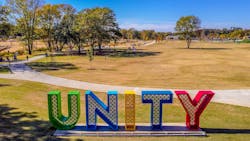Unity Park project brings resilience, flood control efforts to Greenville
Major storms and storm risks are increasing nationwide, with flooding in coastal and river-adjacent regions becoming more frequent. This impacts affordability, developability, and, in some cases, the insurability of these areas, often reducing land values in locations that are otherwise prime for development but burdened by environmental concerns. Local governments face a growing need for implementable planning approaches that protect the built and natural environments while enhancing residents’ access to and engagement with green spaces.
One community that proactively addressed these challenges is Greenville, South Carolina. The Reedy River, flowing through the heart of Greenville, has historically served as both a source of beauty and a challenge to the local community. During heavy rainfall, the river often floods, damaging nearby infrastructure, businesses, and natural habitats. As development encroached upon the floodplain, the need for solutions to manage water flow and mitigate flood risks became increasingly urgent.
The Unity Park project is a prime example of innovative resilience and flood control, transforming a historically flood-prone, blighted area into a thriving 60-plus acre green space. The project addressed decades of environmental challenges by relocating critical infrastructure and undertaking extensive river restoration to create a controlled floodplain. Designed to flood in “the right way,” the park integrates advanced water retention systems, environmentally responsible construction, and thoughtful engineering to manage stormwater, improve water quality, and protect surrounding properties. The success of this $130 million public-private partnership, tested and proven to work during Hurricane Helene, demonstrates the power of collaborative planning and resilient design that works with, rather than against, the natural environment.
The project transformed a 60-acre assemblage that was once undevelopable due to repeated flooding into a vibrant green space using resilient, environmentally conscious design elements to reduce flood risks. Unity Park enhances residents' welfare while unlocking significant development potential and new tax revenues for the community. Additionally, nearby city-owned land has been designated for affordable housing to combat pressure from gentrification in the area.
MKSK was selected by Greenville to design the Unity Park action plan
Since opening in 2022, Unity Park has emerged as an initiative addressing these historical challenges. The dual-purpose park helps control flooding and serves as a model for resiliency efforts nationwide. The park exemplifies how cities can balance development with environmental stewardship to build a more resilient future by employing natural system restoration and effective stormwater management.
Situated in a 100-year floodplain, Unity Park incorporates several key climate resiliency features tailored to its unique environmental and urban context:
- River Benches: Wide, stepped areas along the riverbanks that act as natural floodplains during heavy rainfall, allowing the river to expand beyond its primary channel. This design reduces overflow risks and protects park amenities and adjacent neighborhoods.
- Daylighting: Uncovering river sections previously routed through underground culverts or pipes restores the river’s natural, open state and increased its stormwater capacity. Daylighting also revitalizes ecosystems by creating wildlife habitats and enhancing the park’s aesthetic appeal.
- Wetland Restoration: Restored wetlands absorb and filter stormwater, acting as natural sponges to slow water flow, reduce runoff, and improve water quality by filtering pollutants.
- Flood-Resistant Infrastructure: Using durable, water-tolerant materials ensures the park’s longevity and minimizes repair costs. Pathways, furniture and electrical systems are designed to withstand periodic flooding.
- Permeable Surfaces: Integrated throughout the park, these surfaces allow rainwater to seep into the ground, reducing runoff and alleviating the strain on drainage systems.
The Unity Park project is a model of climate adaptation and resiliency, achieving multiple goals: restoring ecosystems, reducing flood impact, and providing a blueprint for cities facing increased rainfall and extreme weather. By prioritizing sustainability and collaboration, Greenville has created a park that enhances community life and is a benchmark for climate-conscious urban planning.
This approach offers valuable lessons for flood-prone areas nationwide. Communities can achieve dual goals of environmental sustainability and economic growth by leveraging underutilized land to create green spaces that mitigate flooding and increase property value.
About the Author
Knox White
Knox White has served as the Mayor of Greenville since 1995. He is also a former attorney and currently an advisor to The Euclid Group, a consulting firm with expertise in strategic planning and project implementation.
